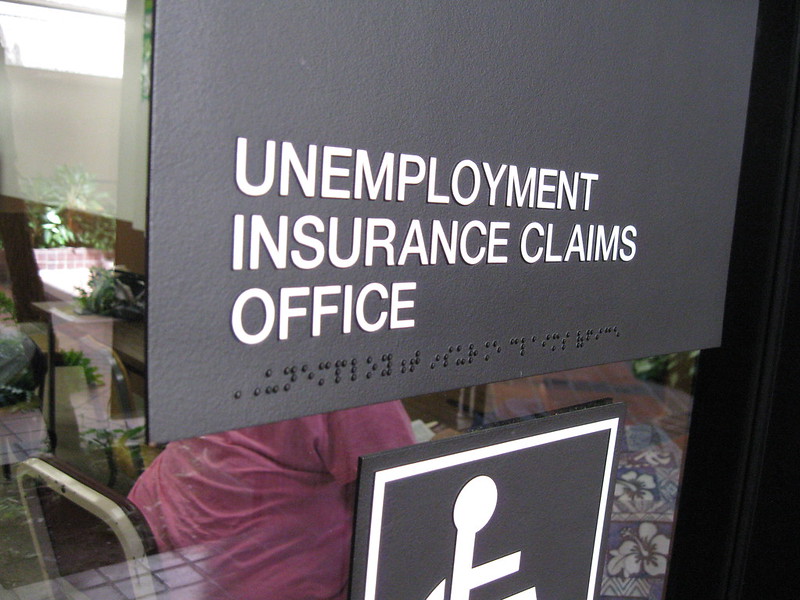Assembly Will Vote On Unemployment, Medicaid Bills
Several bills would remake unemployment system, restrict access to Medicaid.

Unemployment Insurance Claims Office. Photo by Bytemarks (CC-BY 2.0).
A motley collection of bills that would change Wisconsin’s unemployment compensation system passed Assembly committees Thursday, along with other legislation to add new limits on the state’s Medicaid and nutrition programs. All 10 bills have been put on a tentative calendar for the Assembly’s floor session on Thursday, Feb. 17.
In the Assembly’s Labor and Integrated Employment Committee, one of the unemployment insurance (UI) bills (AB-910) got a unanimous endorsement. It was the only unemployment-related bill under consideration that went through the state’s unemployment advisory council with representatives from labor, management and attorneys.
The advisory councils have been in place for decades — since 1932 for the UI council and 1968 for the workers’ comp council.
“When you have an opportunity to bring all the different sides to the table and negotiate, you end up with a much better product,” says Rep. Christine Sinicki (D-Milwaukee), who is on the Assembly labor committee.
One high-profile change the bill makes is to permanently continue changes to the state’s UI Work-Share program that were temporarily installed in the COVID-19 pandemic. Work-Share enables employers to temporarily reduce workers’ hours because of economic setbacks and use UI benefits to replace the wages that the employee loses because of the change.
Consensus doesn’t guarantee satisfaction. Victor Forberger, who represents jobless workers with unemployment insurance claims, is unhappy with changes in the UI advisory council bill, which primarily consists of recommendations from the Department of Workforce Development. “There are tons of questions about why these proposals are needed and what they will accomplish that have never been discussed,” Forberger says.
John Edmondson, a Fox Valley lawyer who represents workers’ compensation claimants, says the workers’ comp advisory council bill raises the agreed maximum weekly payment for a worker with a permanent partial disability for the first time since 2017. That is an improvement, Edmondson says — but had it risen from year to year to keep pace with the cost of living, “it would have been a lot more.”
Still, says Edmonson, when the advisory council process is followed, “the system didn’t radically change.” That broke down in the last decade, as bills outside the advisory council process were introduced, he adds.
No advice, no consensus
By contrast, four other bills that would make much more dramatic changes to unemployment insurance passed on party-line or near-party-line votes Thursday.
AB-883, which would heavily revamp the UI program, has been touted by its authors as a reinvention that would provide jobless workers with much more help in returning to work
But the bill has also sparked skepticism. When it was introduced in October, Forberger wrote on his blog that in turning the unemployment division into the “Division of Re-Employment Assistance,” the legislation envisions “an entity that micromanages claimants’ job search efforts,” with provisions that would force UI recipients back into part-time jobs rather than enabling them to take more time to seek an appropriate full-time position.
The bill passed the labor committee on a 6-3 vote with no Democratic support.
In the Assembly Workforce Development Committee, three other bills rewriting UI law passed Thursday without Democrats’ votes as well:
- AB-937, which would tie the maximum number of weeks a person can collect unemployment to the unemployment rate in a previous quarter;
- AB-938, which would make it easier for employers to claim worker misconduct, disqualifying UI claims. It also would require work search audits and give the Legislature power to block enhanced federal unemployment compensation programs, such as were enacted early in the COVID-19 pandemic.
- AB-939, which would tighten return-to-work requirements for people collecting UI and encourage employers to report applicants who skip job interviews, disqualifying them from UI benefits.
“Those were drafted very quickly — helter skelter,” says Sinicki, who also is a member of the workforce development committee. She said she voted against them because they didn’t go through the advisory council process, and she doesn’t expect other Democrats to support them, either.
Other than the consensus legislation, the UI bills are part of a GOP package that focuses on benefit restrictions to boost employment, an approach that critics say won’t work.
Four other bills in the package passed through the Assembly Government Benefit Reform Committee Thursday, also without Democrats’ support:
-
- AB-935, reiterating the state’s work, job-training and drug testing and treatment requirements for so-called “able-bodied” adults in the FoodShare nutrition program;
- AB-934 requiring the state to confirm Medicaid participants’ eligibility every six months instead of every year and to disenroll anyone not eligible;
- AB-936, disqualifying BadgerCare recipients if they turn down a job or promotion in order to remain eligible for the health care program’s income limits;
- AB-942, increasing the duties of the DHS inspector general charged with preventing fraud.
Unemployment bills, benefits restrictions head to Assembly vote next week was originally published by the Wisconsin Examiner.





















